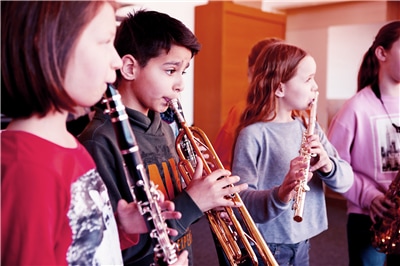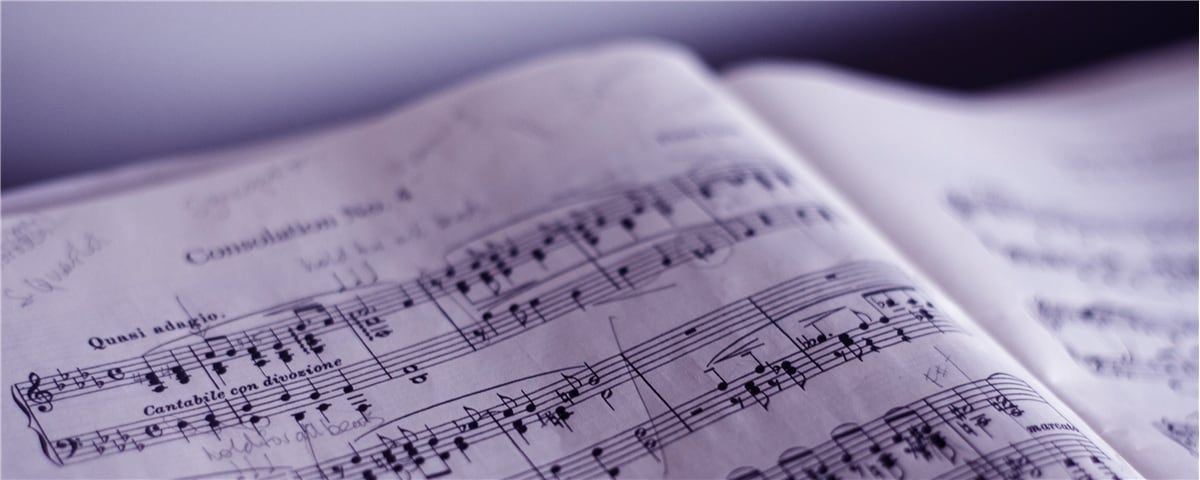Instrumental to Development
Instrumental to development
I had cause to reflect recently on the effect that playing a musical instrument has had on my life. My daughter is now close to the age I was when I first started to play the violin so I'm weighing up the pros and cons of launching her on the same path I trod. Indeed I remember my first violin lesson aged 4, my teacher tying string across the room for me to match the correct angle for my bow. It all seemed very exciting, like I was being let in on a huge secret. Both my mother and sister already played musical instruments, (flute and violin respectively) and I wanted to join in. But then came the practice. urgh.
So, on the pro side:

• It's great for brain development -There's wealth of scientific evidence that playing a musical instrument at a young age is beneficial to brain development, helping sparks zing between the right and left brain hemispheres, artistic and mathematical. This is an excellent thing of course that has far reaching implications beyond music. I'm not exactly sure what- ask a brain scientist person
• It can be lots of fun with the right teacher
• Learning an instrument is great for motor skills and coordination- think rubbing your tummy and patting your head, multiplied a gazillion (that’s the actual maths).
• Mental and emotional health- it opens the door to a world of emotional communication that is beyond any spoken language. This is especially beneficial when the child becomes a teenager. True of course you get an element of this feeling from listening to other people's music too- but to be able to make or perform that music yourself- it's another level.
• It's something other than usual schoolwork, being both a physical and mental activity that doesn't involve screens.
• You get a sense of achievement as each new milestone is reached.
• You learn how to work with people, accompanists, and other musicians, when playing in an ensemble or an orchestra. You learn how to take constructive criticism without taking offence and how to give constructive criticism without causing offence (this is especially true of ensembles and orchestras- and as kids progress through the different levels when they start dealing with interpretation of music and musical phrasing)
• You learn when you have the melody, and when someone else has the melody; when it’s your time to be heard, and when it’s your time to step back and let someone else be heard.
• It takes concentration to work through and 'program' into your mind the way to master a particular technique, or a tricky passage. This is invaluable as attention spans seem to be getting shorter by the oh look at that lovely leaf!
• It teaches punctuality. It's no fun turning up late to an orchestral rehearsal. As the door crashes open, 100 of your peer group turn round, tutting and shaking their heads as you slowly get your violin out of its case.No. Fun. • It teaches self discipline but....
Con
• Self discipline comes into play a bit later. Initially at least, parents or carers have to encourage and I'd go as far as to say, even bribe children to practice.
• Money. There used to be much better funding for music- with schools having instruments and lessons being paid for by the local councils. Now, instruments can be hired rather than bought and at the older level there can be bursaries and foundations to help budding musicians who don't have the financial advantages that some do.
• Time. It takes time to progress, time to practice, have lessons and attend the groups. Time for the children and the parents.
• Pressure/ stress. It can be stressful and it's possibly not for everyone- but...
Pro
• Avoidance of stress isn't necessarily good. It is good to venture out of your comfort zone from time to time because you might surprise yourself and discover you can do more than you thought you could. If you don't try you'll never know. It's also great practice for school exams because I always found those to be comparatively much less exposing than standing up and playing in-front of an audience. I knew if I'd done the work, it would probably be ok.
I found my main love of playing an instrument through playing in orchestras and chamber groups like string quartets- I loved being a part of something seemingly bigger than the sum of its parts- it felt like alchemy. It was only in my final year at school that I decided I wanted to go on to be a professional musician. I went on to study violin at the Royal College of Music which I loved, and straight after that I co-founded the string quartet, Bond- with our emphasis being on the enjoyment of music, combining the rigours of the classical world with a sense of fun and well, LOUDNESS of the pop world.
About the author
Eos Counsell has been in Bond for over 20 years now, writing, recording, touring, writing, recording, touring, over and over. Throughout the years, they've been working with world-class musicians, singers, and composers. They have travelled all over the world. "Strangely perhaps" says Eos "Bond has become my safety net, my safe place beyond which I rarely venture."

